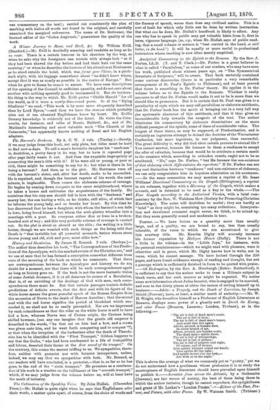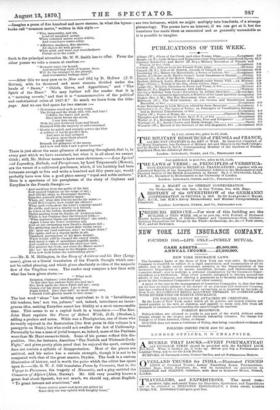Porrar. — We have before us a quantity more than
usually large, and of a quality, we are bound to say, less than usually tolerable, of the verse to which we are accustomed to give
this courtesy title. Mr. Kenelm Digby will scarcely increase. his former reputation by Halcyon Hours (Duffy). There is not a little in the volume—in the "Little Joys," for instance, with its personal reminiscences—which we might read with pleasure, were it- otherwise said in prose, which Mr. Digby knows how to write, not in. verse, which he cannot manage. We have looked through the 350. pages, and have found evidences enough of reading and thought, but not a passage which is sufficiently finished in form to be quoted with praise.. —Of Redemption, by the Rev. A. Horsburgh (Kelso : Rutherford), it is sufficient to say that the author seeks to treat a Miltonic subjeot in blank verse, and has such success as might be expected. We notice some new information about Judas Iscariot, who is engaged to be married, and sees in the thirty pieces of silver the means of setting himself up ha business.—Adela: a Tragedy, and the Death of Lucretius, by Joseph Shield (Prevost), have, at least, a similar merit of audacity.—Mr. W. H. Wright, who describes himself as a Professor of English Literature at Benares, displays some power of a ghastly sort in Death the Enemy, and other Poems (Benarea, Lazarus ; London, Triibner), as in the following :—
" The air is full of dead men's souls, The air is full of men ; The air is full of dead men's bones, And souls that live again.
Above, around, is human dust, In every breath of air, Above, around, are human souls, The dead men's spirits there.
The air is full of whisperings, The air is full of groans ;
The air is full of prayers and sighs,
Of curses, and of moans.
Live spirits whisper round our heads, Live spirits fill the light;
And spirits hover o'er our beds,—
Are with us in the night."
This is above the average of what we commonly get as "poetry," yet we do not understand how a gentleman whose profession it is to study the masterpieces of English literature should have prevailed upon himself to publish it.—Acrostics from across the Atlantic, by a Gothamite (Stevens), are fair verses of society, the best of them being those in which the author imitates, though he cannot reproduce, the sprightliness and grace of Mr. Locker's "London Poems."—L—Echoes of the Past, Pre- sent, and Future, with other Poems. By W. Watman Smith. (Triibner.)
—Imagine a poem of five hundred and more stanzas, in what the hymn- books call "common metre," written in this style :—
" Vice, Immorality, and sin,
When unhtraed nature reigns within, Lead all mankind astray, And conscience scares away.
"Affliction, madness, dire distress, All classes fill with gloom
While grief, and want, and wretchedness
Pursue us to the tomb."
Such is the principal attraction Mr. W. W. Smith has to offer. From the other poems we take a stanza at random :—
"Monastic ruins ivy bound,
And mould'ring walls of bygone days,
Will fix the stranger to the ground,
And sentimental feelings raise."
—After this we may pass on to New and old, by D. McIvor (J. C.
Hotten), with its thousand and more stanzas, divided under the heads of " Dawn," "Chiefs, Caves, and Apparitions," and "The Spirit of the .Blast." We may further tell the reader that it is a "morning reverie," and that it is "commemorative of the political and ecclesiastical crisis of 1867-8." So mach we learn from the title- page. And we can find space for two stanzas :—
" Motionless stood each as any stone,
The living and the dead, still, still, and lone! Cobden, the brave and good, Once more before me stood, I saw him stand, With his pale forehead large and bland. Stamped with the majesty of self-command. "Slowly he paled, and straight across the blue A cabinet of hurdy-gurdies flew, And men in tape arrayed In place, upon them played A gurdy tune!
Beneath the glimpses of the moon.
And now and then I saw a great bassoon."
There is just about the same glimmer of meaning throughout, that is, in every part which we have examined, but what it is all about we cannot
think ; still, Mr. McIver seems to have some cleverness.—Lays Lyrical and Legendary, Ballads, and Paraphrases, by Lord Teignmouth (Moxon),
are the verses of a cultivated gentleman, which, if his lordship had been fortunate enough to live and write a hundred and fifty years ago, would probably have won him a good place among "royal and noble authors." Here is a specimen of his paraphrase of the story of Orpheus and Eurydice in the Fourth Georgic:—
"And scathless from the penis of the way
Now panted Orpheus on the verge of day ; And still his steps, so Proserpine decreed, Eurydice pursued with faithful speed: When, oh! what dire illusion mocks his sense,—
Could Hell forgive, how venial the offence!
What spell o'erpowers the lover's constant mind! He yields, and casts a wistful look behind, In token of the forfeit, thunders shake,
Thrice pealing from its thdepths, th' Avernian lake.
While to her Orpheus us the frenzied bride,— ' What madness blasts our rescued bliss?' she cried ; 'Again I hear the Fates' resistless call.
And on my swimming eyes Death's slumbers fail; The gathering shadows round their victim twine, Ah! meet my fond embrace, alas t no longer thine!'
She snake, and as a vapour melts in air, Vanished, unconscious of his mute despair, While fondly still he clasped the empty shade,
And many a alga of speechless anguish made;
And could no vows restore his twice-lost love, Nor prayers the Gods, nor tears the Manes move? Ah! no: the death-boat to the Stygian coast E'en now bath borne the unreturning ghost."
—Mr. R. M. Millington, in the Story of Aristwus and his Bees (Long-
mans), gives us a literal translation of the Fourth Georgic which can- not be called pleasing, and which gives absolutely no idea of the majestic flow of the Virgilian verse.. The reader may compare a few lines with
what has been given above :— "What rash
Delusion. Orpheus,' cries Eurydice, 'Is this that has undone both you and me?
See, back again the fierce Fates call me; sleep Comes o'er my dizzy gaze; I go in deep
Night folded. Fare thee well: no more thine own, I stretch forth ghostly hands to thee alone." '
The last word " alone " has nothing equivalent to it in " Invalidasque tibi tendons, hen! non tun, palmas," and, indeed, introduces an incon- gruous idea, making Eurydice assert her fidelity at a most unseasonable time. This seems to us a capital fault in a translator.—The Rev. John Hunt reprints the Poems of Robert Wilde, D.D. (Strahan.), adding a preface and notes. Wilde was a Presbyterian, one of those who fervently rejoiced in the Restoration (the first poem in this volume is a panegyric on Monk), but who could not swallow the Act of Uniformity. Personally he was a man of jovial temper, as, indeed, more of the Puritans were than Mr. Hunt seems to think. Some of his poems reflect this dis- position. One, for instance, describes "The Norfolk and Wisbeach Cock- Fight," and gives pretty plain proof that he enjoyed the sport, certainly does not contain a syllable of disapprobation. Most of the pieces are satirical, and his satire has a certain strength, though it is not to be compared with that of the great master, Dryden. The book is a curious illustration of history, and is worth the pains which the editor has spent upon it.—Mr. G. W. J. Gill translates Poems by Cervantes, that is, the Voyage to Parnassus, the tragedy of Numantia, and a play entitled the Commerce of Algiers (Alex. Murray). Mr. Gill very possibly knows a great deal abont Spanish, but not much, we should say, about English. "To grant favours not avaricious," and
Some sixteen years and more are glided by
Since they the war upheld with haughty boast,"
are two instances, which we might multiply into hundreds, of a strange phraseology. The poems have an interest, if we can get at it, but the translator has made them as unmusical and as generally unreadable as it is possible to imagine.































 Previous page
Previous page